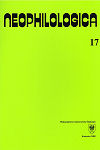Trois langues – trois visions du temps impliqué?
Three languages – three visions of the implied time
Author(s): Stanisław KarolakSubject(s): Language and Literature Studies
Published by: Wydawnictwo Uniwersytetu Śląskiego
Keywords: aspect; time; implied time; simple perfective and imperfective aspect
Summary/Abstract: The category of aspect is described differently in the grammars of the French, English and Bulgarian languages. Having analyzed the aspect in the mentioned languages the author stated that it constitutes a permanent feature of the lexeme and that the basic aspectual meaning of lexeme undergoes no modifications. Therefore, the author rejected the classical theory which suggested that expressing the aspect is impossible without the lexeme remaining in agreement with the aspectual morpheme. Verbal lexemes like: “march(er)”, “reflech(ir)”, “walk”, “run”, “govor(ja)”, “pe(ja)” denote continuing activities and represent specific concepts, the immanent feature of which is defined as the continuing or simple imperfective aspect. On the other hand, lexemes such as: “bond(ir)”, “explos(er)”, “leap”, “spring” denote non-continuing activities – such conceptual feature is defined as the non-continuing (momentary) or simple perfective aspect. The author came to the conclusion that the compared languages are similar on the level of aspectual concepts and thus there was no need to present three respective visions of the implied time. The peculiar nature of the mentioned languages is visible only on the level of the form of expressions.
Journal: Neophilologica
- Issue Year: 2005
- Issue No: 17
- Page Range: 7-16
- Page Count: 10
- Language: French

